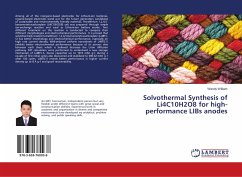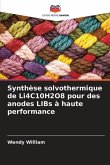Among all of the inorganic-based electrodes for Lithium-ion batteries, organic-based electrodes stand out for the future generation candidates of sustainable and environmentally friendly materials. Tetralithium 1,2,4,5-benzenetetracarboxylate (Li4C10H2O8) salt was prepared through simple ion-exchange reaction and used as Lithium-ion battery anode. Two different treatment on the reaction is conducted to compare their different morphologies and electrochemical performance. It is proved that solvothermally treated tetralithium 1,2,4,5-benzenetetracarboxylate (Li4BTC-S) has better morphology and electrochemical performance, especially on high rate current density. Well-ordered uniform nanosheets of Li4BTC-S exhibits better electrochemical performance because of its porous sites between each sheet which is believed decrease the Li-ion diffusion pathway. DFT calculation were performed to understand a new storage mechanism of Li4BTC-S. Excess capacities up to 1016 mAh g-1 during a couple of first initial cycles also discovered and stabilized to 600.62 mAh g-1 after 100 cycles. Li4BTC-S reveals better performance in higher current density up to 8 A g-1 and good recoverability.
Bitte wählen Sie Ihr Anliegen aus.
Rechnungen
Retourenschein anfordern
Bestellstatus
Storno








